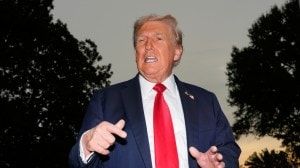Drop N-cap demand, stop blocking funds; India tells US
New Delhi, Jan 6: The US must drop its demand to freeze India's nuclear capability at the present level as well withdraw its opposition t...

New Delhi, Jan 6: The US must drop its demand to freeze India’s nuclear capability at the present level as well withdraw its opposition to all multilateral lending, before India signs the Comprehensive Test Ban Treaty (CTBT).
Highly placed officials in the government, who seemed to feel that a CTBT signature was no longer such a big deal, confirmed that the next round of talks between External Affairs minister Jaswant Singh and US deputy secretary of state Strobe Talbott, in the capital on January 28-29, would be the most crucial yet.
“A question mark hangs over this meeting, in the sense that both sides will decide here the fate of the relationship as it has evolved since India’s nuclear tests in May,” the official sources said.
January, in fact, seems like a crowded month for New Delhi’s talks with the Western world. Principal Secretary Brajesh Mishra will meet French president Jacques Chirac as well as his counterpart Gerard Errera on January 18-19 in Paris, and then fly onwards to London to breakbread with British foreign secretary Robin Cook on January 20.
On the Indo-US dialogue, the official sources said New Delhi had repeatedly told Washington that it would not agree to freezing its nuclear capability at the present level, a key demand reiterated by US ambassador to India Richard Celeste only yesterday.
“We have told them that we will not accept any nuclear restraint or strategic restraint. Under the circumstances, the discussion over India’s minimum nuclear deterrent becomes crucial,” the sources added.
Interestingly, the sources seemed comfortable about the fact of New Delhi signing the CTBT, implying that in the light of the recent parliamentary debate on the Indo-US dialogue — where PM Vajpayee gave specific assurances on national security — such a signature would be a mere formality.
They explained that such an event would be preceded by an assessment on both sides, which debated whether or not such a signature would “be helpful” for Washington in its effort to get its ownSenate to ratify the Treaty.
On the other hand, the US would have to agree to come to terms with a nuclear India. Further, Washington would also have to drop its opposition to lending from multilateral institutions such as the IMF, before New Delhi actually signed on the dotted line.
Meanwhile, Mishra seems set for his next round of talks with France as well as an encounter with Cook. The sources said the Indo-French dialogue seems to be proceeding along a similar “pattern” as with Russia.
The sources agreed that vital differences remained between Paris and New Delhi, most of them over how to gradually and formally integrate India into the world’s nuclear regimes. They said Paris was especially keen on participating in India’s expanding energy plans, particularly in the civilian nuclear energy sector.
“We have told them that we are ready to accept facility-specific safeguards on the lines of what is being done at Kudamkulam, Tamil Nadu, but that we cannot accept fullscope safeguards,” the sourcesadded. On the other hand, other aspects of the relationship, such as defence, civil aviation, economic, etc, would proceed independently.
The significance of the continuing dialogue with Paris — after Moscow two weeks ago — seems to be that New Delhi’s post-Pokharan isolation is ending. China is now the only P-5 nation (one of the permanent members of the Security Council) with which India does not have a formal dialogue.



- 01
- 02
- 03
- 04
- 05



























